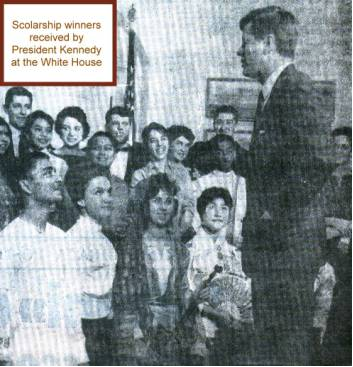The Forum lasted from 1947 to 1972!
The first Herald Tribune Youth Forum was held in New York in 1947. It was established immediately following World War II out of a conviction that the best way to promote world peace was to bring young people from around the world together to get to know each other and people of their own age in the United States.
They would recognise their common humanity and aspirations for peace and democracy and, it was hoped, create ties with the United Statesso that when they eventually assumed leadership roles back home, the US would have friends in leading positions in countries all over the world.
The New York Herald Tribune Newspaper had, since 1930, organised an annual Forum that brought together government leaders and prominent people from other fields for discussions in New York City.
.jpg) |
Helen Hiett Waller, an accomplished journalist and former War Correspondent, was hired by the Herald Tribune in 1945 to direct that Forum. Under her guidance, the Herald Tribune then established the World Youth Forum, which ran concurrently with the original Forum, until the latter ended in 1955. The family that owned the Herald Tribune, particularly Mrs Helen Reid, threw their support solidly behind the World Youth Forum. |

In its first year, the World Youth Forum drew students exclusively from the Americas. The following two years focused on Europe especially those countries receiving Marshall Plan assistance. From then on the field broadened to include Asia and the Middle East. As African countries began gaining independence, they too were invited to send Delegates. 1951 was the only year in the World Youth Forum’s 25-year history when no students were brought to the US, probably due to the situation in Korea, which many
people feared would lead to another major war.
Most Delegates were selected to represent the youth of their countries through a national competition organised by their Ministry of Education. The standard requirements were to write an essay – usually on the topic of “The World We Want”. Finalists were then invited to personal interviews, and the best of them was chosen.
Three month stay
Although there were variations in organization over the years, the essence of the Youth Forum remained the same. Delegates ranged in age from 16 to 18 and were usually in their last year of high school. They came to the New York area for a three-month stay, living with host families and attending schools in different locations for 2 to 4 weeks at a time. In between home stays, the group came together for sightseeing and travel. In most years the group went to Washington, DC, and had a chance to meet the President of the United States. They debated world issues on television in a series broadcast to the New York Metropolitan area called “The World We Want” and later “Young Worlds”. In some years, additional funding was received and the group travelled to other countries. In 1960, for example, the Forum Delegates were invited to spend two weeks in Ghana as guests of the Ghanaian government.

Forum delegates received by President Kennedy
at the White House
Helen Waller died in August 1961 at age 47 following a tragic mountaineering accident. She left behind her husband, three young children and a program that had thrived under her dynamic leadership. For more on Helen Waller’s career, click here.
Next phase
.jpg) |
The New York Herald Tribune was committed to continuing the Youth Forum and brought in Virginia Graves Wieschhof to direct it in 1962. Mrs. Wieschhof was a former teacher and education administrator who had been associated with the United Nations for many years in connection with her husband’s work. Heinrich Albert Wieschhof, who was Director of the UN Department of Political and Security Council Affairs, was travelling on a peace mission with Secretary General, Dag Hammerskjold in April 1961 when their plane crashed in the Congo and both were killed.
For more on Mrs. Wieschhof, click here.
|
.jpg) |
Robert S. Huffman followed Mrs. Wieschhof as Director of the World Youth Forum in 1963. Under Mr Huffman, the Forum’s activities were expanded in 1964 to include a European Summer Program for outstanding American high school students. The six week summer itinerary took in several European countries and combined social science, history and culture. The program varied in different years and with different groups, but generally included visits to factories, meetings and discussions with journalists, union leaders, government officials and student leaders. European-based Forum Alumni were invited to join the summer groups and to participate in organizing the program. Their involvement contributed to the unique depth and personal exchange of the summer Forum.
|
Changing context
As successful as the World Youth Forum was, the context was changing. People were travelling more, other student exchange programs were gaining in popularity, and airlines no longer donated free airfares for delegates. The New York Herald Tribune suffered financial strain in the 1960’s and finally shut down in 1966. A new amalgamation, the World Journal Tribune reluctantly took on the World Youth Forum, but that newspaper folded soon afterwards.
Since the World Youth Forum had been independently chartered as an educational institution by the state of New York, it was able to continue operations, although funding remained a difficult issue. CBS-TV in New York, which broadcast delegate debates, provided major sponsorship in 1967 and 68 and continued some level of support until the Forum had to close in 1972. Times had changed, but the idealism and international exposure had left an indelible imprint on 25 years of Forum delegates.
Last revised 29/07/2013
In order to view and print most documents available on our site you need to have Acrobat Reader.
If you do not have this you can download free of charge by clicking here